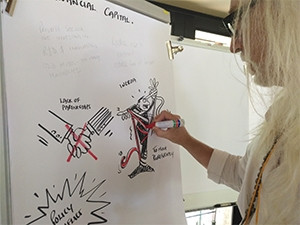
The Science and Innovation Ecosystem World Caf'e event, held this week in Pretoria, aimed to build an understanding of what does or does not work in innovation within South Africa.
The event was initiated by the Embassy of Switzerland in SA, in partnership with the Human Sciences Research Council, the National Research Fund and the University of Pretoria, and took place in the Pretoria Botanical Gardens.
Over 50 representatives from the science and innovation ecosystem in SA attended. This included people from government (national departments, agencies and specialised bodies), thought leaders, entrepreneurs, civic organisations, start-ups, professors, scientists, and executives from the private sector.
The World Caf'e event is a movement which has taken off worldwide and aims to bring people who should be talking, but often don't, together in an informal setting to encourage candid discussion.
Lesley Williams, from Impact Hub, who facilitated the event, said there is a lot of information shared at traditional conferences but real insight is found during coffee breaks when people interact, and the World Caf'e attempts to recreate those moments.
Margaretha van Schalkwyk, one of the organisers of the event, explained that attendees were broken into groups and given a topic to discuss for 30 minutes. The groups were then mixed up and discussion continued, with the aim of cross-pollinating ideas and conversation, she said.
Feedback is then given by each group and a graphic recorder illustrates the outcomes so that common themes can be easily identified.
The three topics discussed on the day were financial capital, human capital and system performance. Each table had an accompanying 'menu' with a list of questions such as: What resources do we currently have that can be optimised for scientists and innovators? What barriers could inhibit us?
More than numbers
Jacquelene Friedenthal, science and technology counsellor at the Swiss Embassy, says Switzerland is very interested in investing in research surrounding innovation in South Africa. She said since 2008, the country has helped fund at least 50 research reports, to the value of around R200 million.
"We want to strengthen collaboration between SA and Switzerland, and we feel if we are a part of the conversation with all stakeholders, we can get a better idea of what needs to happen," says Friedenthal.
She hopes to take the outcomes of what was discussed, and marry it with hard facts gained from South African indicators on science and innovation to create a more holistic view of the local innovation system.
"I get so frustrated with thick reports that you have to read carefully through. Everyone must be able to understand it!" says Friedenthal, who believes the World Caf'e will help.
Davis Cook, CEO of the Research Institute for Innovation and Sustainability, which is facilitating the event on behalf of the Swiss Embassy, said events like this give the human perspective that reports filled with numbers often lack.
"How do you measure the trust that the private and public sectors have for each other?" was one example given by Cook.
"Innovation is a risk-taking exercise and trust is important, and the only way to find out how people feel is to ask them."
Cook said one of the main themes he saw come out of the event was that all stakeholders want to create a common vision for SA and how to move it forward.
This is the first World Caf'e held by the Embassy of Switzerland in SA and it hopes to hold a second one next month which will look at the topic of energy.
Share